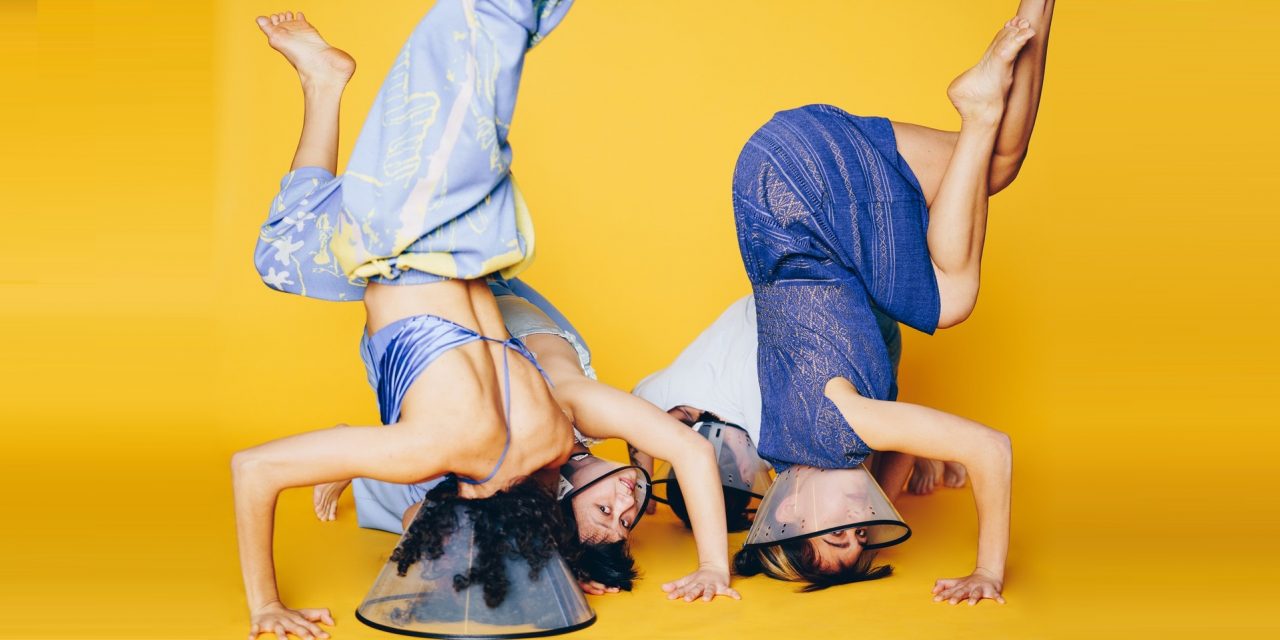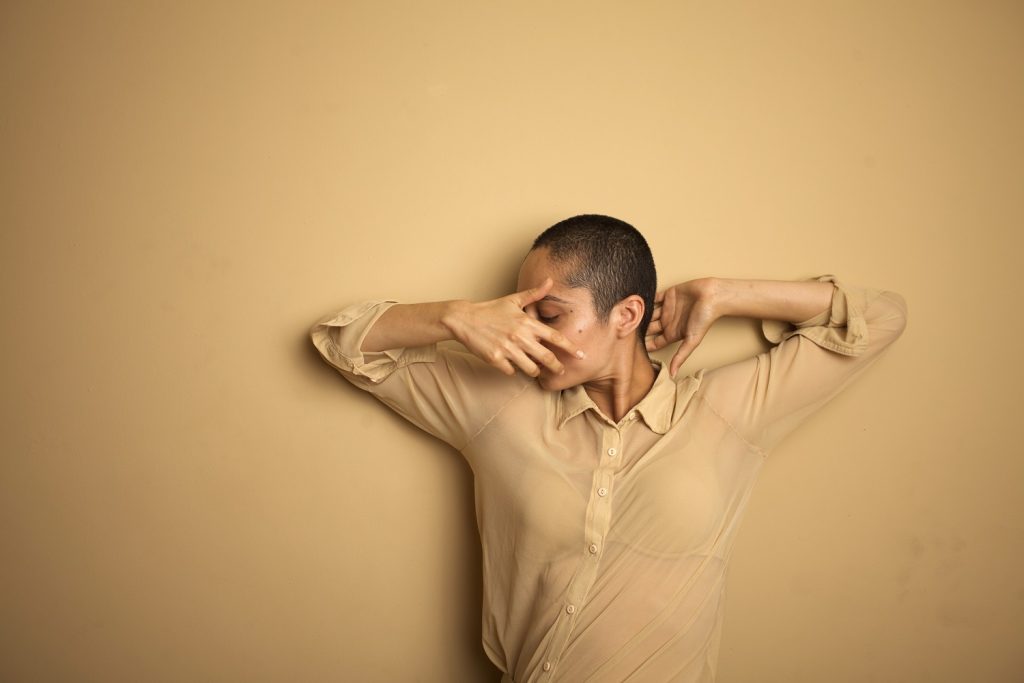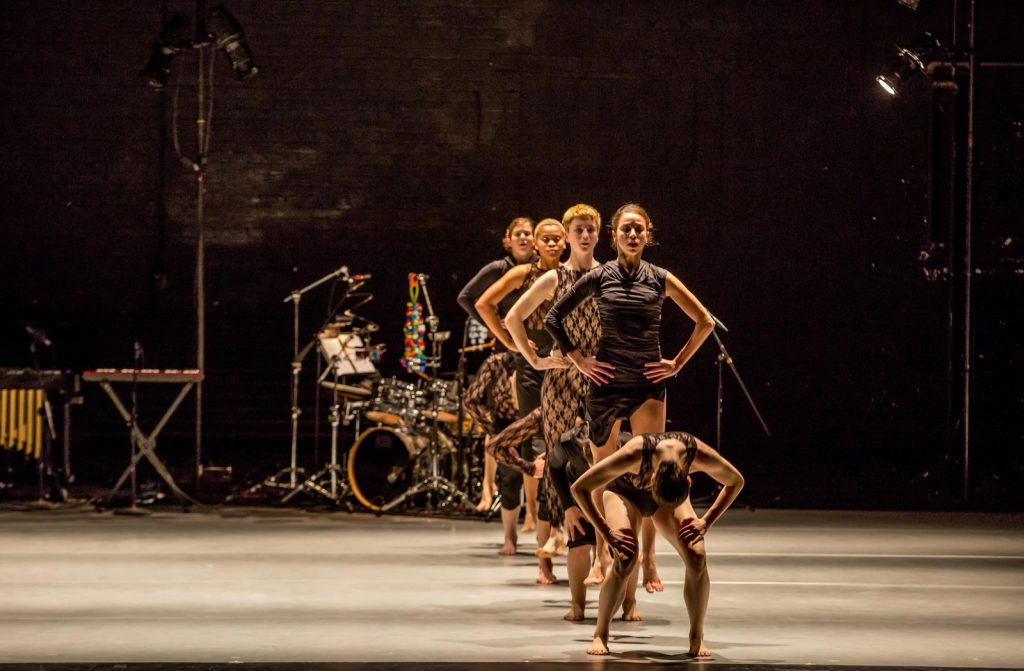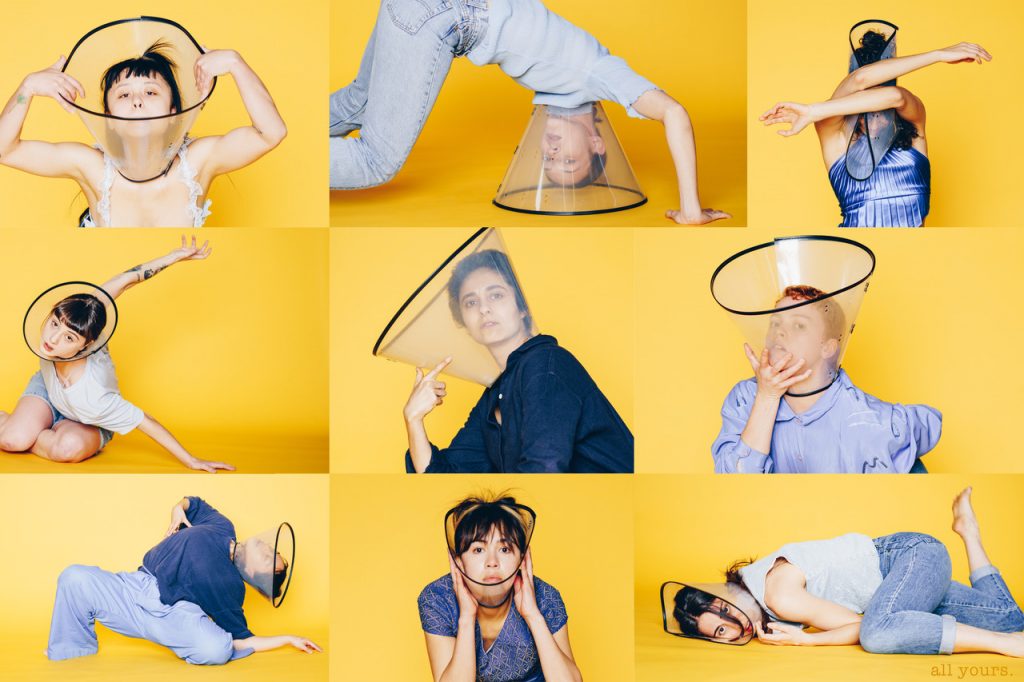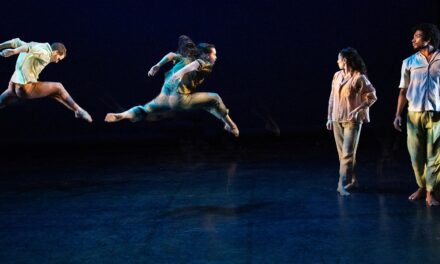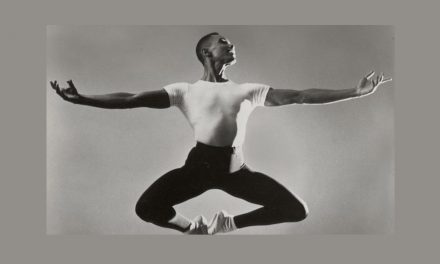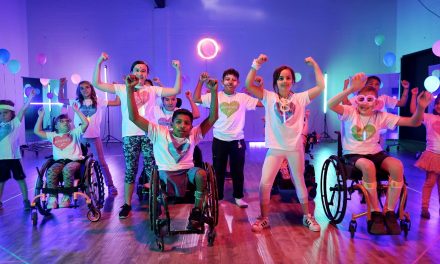“I was born in a country of conflict and I moved to a country that avoids conflict – now I’m looking for new habits.” This sentence stood out while reading about Danielle Agami, the Founder and Artistic Director of Ate9 Dance Company, on the company’s website. It was especially pertinent because I had just interviewed Agami about her enormously powerful video Reboot, a video that in two short minutes makes numerous provocative statements sans malice.
For readers who might not know Agami, she was born in Israel, studied at the High School of the Jerusalem Academy of Music and Dance, and performed in Jerusalem’s Hora Dance Company. For three years she performed with the Batsheva Ensemble under the artistic directorship of Ohad Naharin (creator of Gaga movement language), before becoming a member of Batsheva Dance Company (2005-2010). Agami was the artistic director of Batsheva Dancers Create for two years, and she served as the company’s rehearsal director from 2008-2010.
Reboot exposes many issues, but like the pandemic, Agami’s video aims a spotlight at the weaknesses within our democracy and the centuries long inequities among members of our society. This brief video makes a crystal clear statement that we must “stay woke” and seize this opportunity to bring about change. We must reboot!
Agami has lived in the US for ten years and my first question for her was if the county appeared to have been altered by the events of the past three months?
“There is a process that you go through when you move to the United States.” Agami said. “There’s a shocking echo that comes to you from the sides; the rhythms, the trends, the fashions and the illusion that everybody agrees on the lifestyle. They commit to and, like it or not, they obey.” She went on to compare her life in Israel and how a society like the one in America that conforms to discipline, felt very foreign to her. “In the beginning I was a little bit angry, and then a little bit apologetic and feeling like I should learn that. I had my own way to resist. I never managed to agree to using Facebook as an individual, Instagram as an individual or to use a dating app as an individual. It took a lot of energy for me to resist.”
Agami believes that finally something is changing and feels a softening or a negotiating within herself. She informed me that she will soon be attending her oath ceremony to become an American citizen. I had a sense that because of the shifts in how Americans are thinking and acting, that she could finally experience pride in becoming a citizen of this country and that she is, after ten years, beginning to feel at home.
“I feel that the country must change,” She added. “but I also have respect for the experiment that was happening here for hundreds of years, trying to invent something new. Trying not to be an extension of Europe. Trying to be unique and popular, but also to be a leader.” Agami reflected on how experiments go wrong or fail but that she had great respect for a country that was willing to admit that parts of the experiment have gone awry and are found lacking.
Following some discussion about politics and how people appear to be waking up, Agami said. “Yes! It is a powerful moment!”
During the pandemic, Agami began to write and published an article about how many of the goals that she perceives Americans as having – achievements, pleasure and happiness – are not enough. That for her these are not interesting enough as a goal. “Humanity can not just have happiness and materialism as a goal.” She said. “What happens to us? We just roll inside with pleasure and we become blind.” It is an image that Agami feels America projected and that the rest of the world followed. “It’s a mistake.” She concluded. “It is a partial idea and it must have contrast; it has to have something balancing on the scale – our pleasure, Mother Nature, the weak, and the animals; everything that deserves to be listened to and protected. It’s not just the humans. And, the humans that need us to pay attention to their sensitivity.”
Agami designed, performed in, did some of the camera work, as well as the film and sound editing for Reboot. It is short but packed with strong images that cause one to reflect on inequality, effects climate change, the need for infrastructure repairs, and the acceptance of her own body now that she no longer dances as much. The latter can also be seen as the objectifying of the female body; a woman totally nude except for a long grayish scarf wrapped around her head to obscure her face. Because of what is happening around the world, I even thought of Lady Justice being truly blind. Art is to be interrupted by those that are experiencing it.
“It’s not about me standing in front of you,” she said. “It’s about a human body standing in front of you!” She admitted that she does not like how she appears right now, but that it was very necessary that she put that in the video. “I feel very fragile. My skin is not well and my mood is not well, and the country is the same as me right now. It has to be exposed!” She added that she did not want to photoshop her image or hide anything, but to focus on the disappointments and weaknesses that she is experiencing. “To cover my face was also to say that I am anyone and that I am available to anyone to watch.” Agami explained.
When asked how she was managing to keep Ate 9 going, Agami gave a slight sigh and said, as many have, that the company was having to rethink everything, and that they are doing so. She described a kind of wave that has occurred during the pandemic, and again it is progression that others have expressed to me.
“The first period,” she explained, “was about letting go, about feeling that dance was over.” By that she meant that there were not going to be concerts anymore, to touch one another. “We’re not going to have mind space for dance and to construct art.” It was a view she shared with several of her colleagues. “And then all of a sudden there was a new urgency, new fire and many new ideas, and a sense of a new commitment to the country that took me in as an artist,” she added.
Agami explained that she is listed as an artist on both her green card and citizenship application. “There was no shortcut.” She said. “I came here as an O1 and now I am a citizen because I had this passion to make work in America.” She stressed that now more than ever it is time to make work in America and she feels mature enough to move her work another step forward. “I am always thinking about the weak, and racism, acceptance, conflict and war, terrorism and womanhood.” Agami said. “I always have that in me.”
The dance artists who work with Ate9 understand Agami and her feelings about these issues, and she explained how she never felt it necessary to shout about them from the stage until now. She understands that if she discovers a way to express how the world is changing, that she will also evolve. “It means that people can change.” She said. “And I am learning that right now, and I am excited about that.”
Agami used Germany as an example of how a country can change. How, after WWII the people of Germany worked to advocate for the right ideas regarding humanity. “We have to believe that our generation is powerful enough to make it better, to just make it better!” She admitted that it is partially due to social media, this thing that some of us worked hard to stay away from, is part of what has aided the country and the world to come together at this time. People are now using social media to have discussions around important topics rather than focusing solely on the frivolous.
I expressed hope that people around the world will stay woke once the intensity of this time has passed. “Then that is our job as artists,” Agami added. “People have to go back to their commitments and obligations, and it is our job to keep them awake.”
More than any other time, Agami knows that now is when she, as an artist, must act to use her work to assist in bringing about change. “Being raised Jewish and growing up in Jerusalem, a very complicated city, I needed a break from a break from those traumatizing subjects. Now I am stronger and more available to take on more.”
When I mentioned that she had a lot to adjust to after migrating to America, she chuckled and agreed that there is a lot to adjust to. Then she wisely added, “You have to choose how much you’re going to change to the place or how much you’re going to change the place.”
Dance in Los Angeles was at the beginning of surging forward when Agami brought Ate9 here from Seattle several years ago. She and her choreography have definitely helped raise the quality of dance work in LA. Dancers, especially the women, who work and perform in Ate9 have discovered an inner strength and knowledge that they can make work, create a community and as Agami stated it, “Even when they left the company, they did so empowered, and that is very important to me.”
I brought up the fact that since the pandemic forced everyone inside, that many dance artists have become more comfortable working with technology. When asked if she planned on incorporating multimedia into her work, she said, “Yes. I think that I am now more interested in having more evidence to what we make, and I think that video is part of that.” She spoke to the fact that her work on video or online would allow more people to experience her art without having to tour and “to have a product that is communicative and managing to represent what we are doing”. She admitted that she never had the confidence that dance on screen was something for her, but now is interested in researching how to make dances for the camera.
“The next few months will be related to those ideas, and I am also curious in solving live performance outdoors in this moment of limited spacing.” Agami said that she wants to explore a lot of ideas that she has regarding outdoor performing that have nothing to do with the effects of the pandemic, but performances that would be beneficial to the company well beyond the time when theaters or other venues have reopened. Her ideas are ones that she believes her company members will also find intriguing.
“I think that Ate9 wants to be even more involved with the community around it,” Agami said. “We want to reach out, volunteer, bring art to younger ages like we used to do when we first started in LA.” She wants to expand the company’s range to include all colors, ages, indoor and outdoor performances and she wants to understand more about the city itself. Agami wants to bring together a large group of dancers for a performance at one of the museums in town and hopes that major high schools and colleges in the area will collaborate with her on this project.
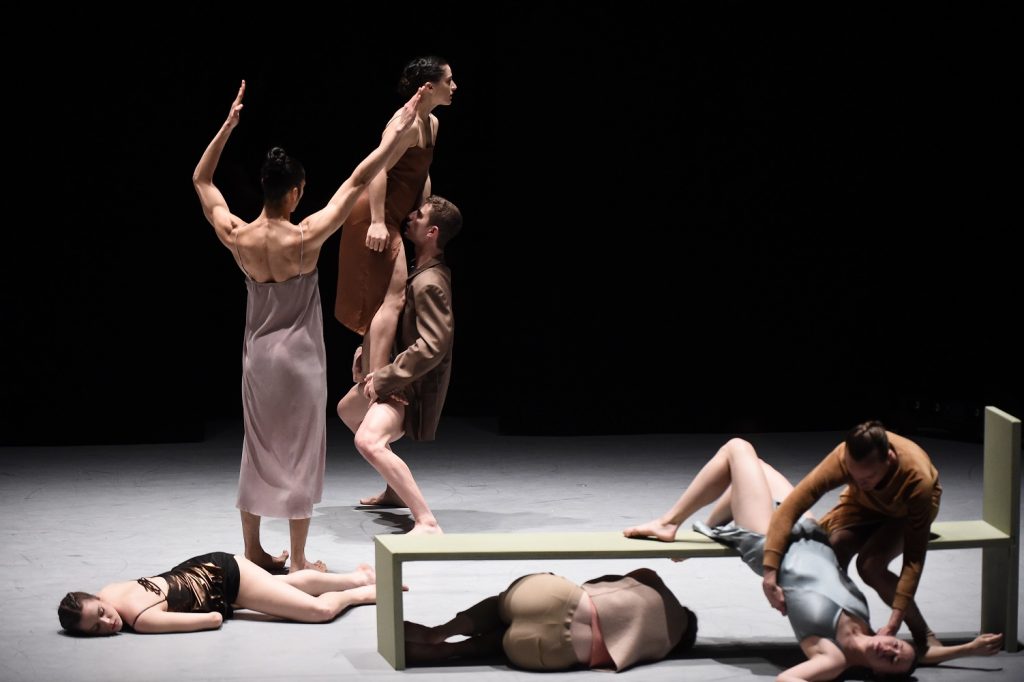
Ate9 performs “a blind LAdy” by Danielle Agami at the Wallis Annenberg Center for the Performing Arts; (l-r) Paige Amicon, Jobel Medina, Genna Moroni, Jordan Lovestrand, Devon Joslin, Rebecah Goldstone, Alexander Quetell; PHOTO CREDIT: Dan Steinberg
It took a long time, but Agami now feels rooted in Los Angeles and she is ready to commit to being in LA; to take on what is in front of her and in experiencing the local needs.
Everyone is wondering what dance and art will look like post pandemic. “I think what evolution shows us is that what is urgent provides,” Agami said. She told me that at the beginning of the pandemic she began wondering what was here before all the buildings were built, all of the technology and the airplanes, etc. “I realized that dance was here,” she said.
“I think that a nation has to honor the Arts and I think that America will have to grow up to that idea.” Agami is not alone in believing that it is way past due for America to join other countries in providing more financial support for the Arts and other necessary needs for its citizens.
“Eventually evolution will show that we care for Art. It seems that artists change the opinion of the country more than any other politician,” she said. “So, we have to embrace that power and Art can only get better.” Agami does not believe that Americans are any different than people in other countries such as Germany. If artists put their work in front of people and they are intrigued, then those people will pay attention. “Artists must pay attention to what is urgent and continue to find different methods of communicating those ideas”.
Written by Jeff Slayton for LADC, June 17, 2020.
To watch Danielle Agami’s new video Reboot, click HERE.
Art: Ate9, Danielle Agami
Camera: Selena Moshell, Danielle Agami
Edit & Sound: Danielle Agami
To learn more about Ate9 Dance Company, click HERE.
To read Danielle Agami’s article Human Nature Needs A Change, click HERE.
Featured image: Ate9 – All Yours – Photo by Cheryl Mann

